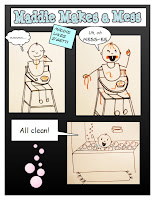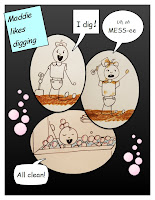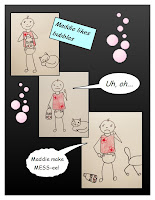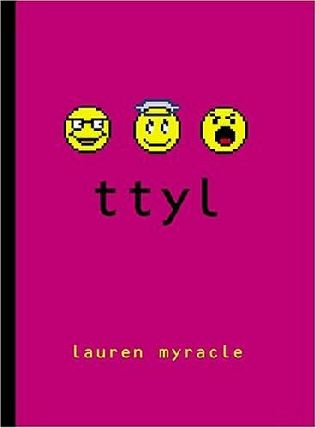In honor of Free Comic Books Day, here is a Maddie comic.
Click on each page to see it bigger.
Warning: preschool humor!



Viewing: Blog Posts Tagged with: Maddie, Most Recent at Top [Help]
Results 1 - 9 of 9
Blog: Dawn Bonnevie (Login to Add to MyJacketFlap)
JacketFlap tags: comics, Maddie, Add a tag
Blog: Dawn Bonnevie (Login to Add to MyJacketFlap)
JacketFlap tags: Maddie, Add a tag
Blog: Dawn Bonnevie (Login to Add to MyJacketFlap)
JacketFlap tags: Maddie, Add a tag
Blog: Dawn Bonnevie (Login to Add to MyJacketFlap)
JacketFlap tags: Maddie, Add a tag
Blog: Dawn Bonnevie (Login to Add to MyJacketFlap)
JacketFlap tags: Maddie, Add a tag
Blog: Dawn Bonnevie (Login to Add to MyJacketFlap)
JacketFlap tags: Maddie, Add a tag
Mommy cooks dinner,
Meg sets the table…
and Maddie, too.
Mommy washes the dishes,
Meg dries them…
and Maddie, too.
Mommy paints up high,
Meg paints down low…
and Maddie, too.
Mommy plants flowers,
Meg pulls weeds…
and Maddie, too.
Mommy knits,
Meg learns…
and Maddie, too.
Mommy reads,
Meg writes…
and Maddie, too.
Mommy kisses,
Meg hugs…
and Maddie, too.
Blog: 3 Evil Cousins (Login to Add to MyJacketFlap)
JacketFlap tags: Lauren Myracle, TTYL, Angela, Zoe, Maddie, Add a tag
 Lauren Myracle is a genius 4 writing TTYL. Maddie, Angela, and Zoe r my heroez!!! They r sooo strong and tuff! First Angela thinkz shez found Mr. Ryt but he turnz in2 Mr. Yea Ryt. Ther iz also Zoe and her Englush teacher, whoz 24. They start going 2 church 2gether and totally start crushing on each other. Then, wen I thot nuthing mor cud happen, Maddie getz "betrayed" by her frend Jana.
Lauren Myracle is a genius 4 writing TTYL. Maddie, Angela, and Zoe r my heroez!!! They r sooo strong and tuff! First Angela thinkz shez found Mr. Ryt but he turnz in2 Mr. Yea Ryt. Ther iz also Zoe and her Englush teacher, whoz 24. They start going 2 church 2gether and totally start crushing on each other. Then, wen I thot nuthing mor cud happen, Maddie getz "betrayed" by her frend Jana.Blog: (Login to Add to MyJacketFlap)
JacketFlap tags: library technology, Add a tag
A few library folk have succumbed to the "I work on the Web" (IwoW) phenomenon. This seems to be a good thing. They explain themselves and their work, which happens to use, appear on, or be conducted through Internet sources. This sort of cascading collective activity is referred to as a meme—the term being both for the action and its result.
I have not yet become part of this particular meme. I suppose that means that it is a youm—something others have done, without my participation. Or perhaps it is a theym, there being multiple memers at work.
I guess that my not having joined in yet, coupled with my own separate set of activities, constitutes an im, as in im not meming with theym yet.
This writing therefore comprises an im; an independent composition or work intended to be considered as such, and broadcast upon or via the Internet. Were it to be memed into a theym, it would still remain an im to its author, though it became a theym amongst them who memed it. See how that works?
At any rate, I will now join the meme of IwoWers by the submission of the following passage, which reveals what I’m doing in that regard:
I work on the Web. I write a blog; actually a couple of them, this being one. I am primarily and essentially a writer; I predate the Internet. In fact, I predate the personal computer and the electric typewriter. I do not predate Walt Crawford, who was present at the Big Bang and responsible for the current dimensions of the visible universe.
I don’t write code, unless you consider vernacular English as such. I relate to the Internet as earlier writers to the newspaper, books and pamphlets; it is a palette, a canvas, an electronic Big Chief tablet awaiting my pencil. I use the Web because it sends out my writing so that other people may read it if they wish, for free, in privacy and without obligation. In that sense the Web exceeds any other form of publication, in fact, all others arising to date. It allows the craft of writing to reach its ultimate level, which is to say, it eliminates all barriers between the mind which creates and the mind which consumes. There is no publishing house or editor, no censor, critic or bluenose standing between the principals in this relationship. What the Web represents is the achievement of a goal sought since writing was done with a chisel—absolute freedom for the author, and for the reader as well. That, far more than any purely technical consideration, represents the triumph of the Web.
And this statement, my im, may be memed by youm or anybody who desires, theym being as free to write as I am, and to read at liberty, as well.
Michael McGrorty
Add a CommentBlog: (Login to Add to MyJacketFlap)
JacketFlap tags: library technology, Add a tag
Not long ago I was interviewed for a position at a large public library. My panel consisted of very senior librarians, both just below the chief librarian in rank. Of course, at the time they were nothing but handshakes—brand-new faces with names. When I got home I researched them, just to see who I had been dealing with. I’m sure you do the same thing with people you encounter.
The result was, practically nothing. None of them had any Internet presence at all. No website, no blog, no technical activity, no conference notes, speeches, panel appearances--nothing at all that could be considered the mark of a modern, technically-savvy professional librarian. Mind you, these folks are a step down from the top post--and reviewing candidates for employment.
This is not the first time I've found this. By far the vast majority of high-level library managers I've interviewed with can be Googled until the cows come home, with no particular result except a name listed on a staff ladder.
During the interview I was asked the usual question, "As a new librarian, what would you do to determine the needs of your community of patrons?" My response was as it has always been: “I would do my best to make contact with a broad cross-section of the patrons by any means possible, but especially by the Internet, which is fast, cheap and easily used to communicate ideas and questions, and to receive responses in return." I added that I would immediately establish a personal blog as a means of maintaining a conversation with the patrons, and to introduce them to the use of the Internet and computers in general. I said also that I felt that maintaining a presence on the Internet humanizes the position, makes the library and librarians seem more in the service of the public than merely a box of books across from the city hall.
I don't think that answer was received very well. It usually isn’t. One of the problems is that the sort of folks I've run into on interview panels don't think that they want to have an extended conversation with the public; that, and they wouldn't have any idea of how to do it. They don't have that idea that you've got to provide something more than the same physical entity we’ve been throwing the doors open to for a century now. These are the come-and-get-it librarians, the people that the computer age pushed ahead of it--who didn't ride the wave but were projected forward, toward retirement, without ever running even a short ways up toward the crest. Their closest counterpart is the middle-aged foreigner who never learns English because he's spent his most of his life in another cultural milieu.
The thing about librarian interviews is that they are conducted in a rigid, traditional format. That’s the same thing I don’t like about the modern library. And that’s the thing driving away patrons to other pursuits. Pretty soon, when the generation of people who have always gotten their reading material and their news and their information from the Internet are old enough to have children, they aren’t going to take those kids to the library as toddlers, as I was taken. They’re going to plunk the kid down in front of a computer and let her choose. If the library has no presence on that screen, if it can’t or won’t go with the technology and the flow of progress, then we will see quite a few more library bond issues go down to defeat, and the fate of the big box with books inside will have been sealed. Right now I can chat with people halfway around the world about anything I want—any product, any service, any book, for that matter. The library needs to figure out if they want to be part of that conversation, or die a slow death in the shadow of city hall.
[By the way, I am not impressed by the use statistics which indicate that the library is checking out more books than ever, et cetera. I do know this: I don’t go to the library for books very often. The reason for this is that it is far less convenient than discovering information or obtaining information through Internet sources. Apart from that, I am often blocked by the inability or the refusal of librarians to communicate via email, to provide information over the computer or to perform adequate research online. I’ve spent many years as a researcher and investigator and can attest to the fact that as information has moved from static to virtual sources, the public library has not kept pace.]
If you read library journals you’d think that the public library was exploding with connectivity, with access, with people who want to get out among the public, put the library in the forefront of information and entertainment progress. You may be disabused of this notion by simply visiting your local outlet. [I worked at a library whose staff were aghast at the idea that I would respond to complex questions by email after my shift] The problem is less hardware than librarians who belong to the come-get-it school. Note to them, and for the record: you may have built it, but they aren’t gonna come. We can write all the articles we want about wooing patrons, but the truth is, we’ve got to go where they already are. And that, I feel obliged to mention, is not in the physical library, nor will it be again soon.
In a world where retailing has moved to the Internet, where most people read their news and shop online, where people correspond via the computer, you still have to go downtown to find a librarian. Even if she will respond to your email request, if you want to experience the relationship, you’ll have to go visit in person. She won’t, for the most part, come to you.
It is the fate of new ideas to have to carry the old ones out before them, like workers pushing wheelbarrows out of a dim and cluttered basement. Right now I see a small but growing cadre of progressives shoveling away at a mountain of indifference, stale tradition and inertia. I hope they can make a dent in the pile before it doesn’t matter anymore.
Profile of a Thriving Public Library, circa 2025
--Performs the vast majority of its reference service online.
--Contacts every household in its area of service at least once annually.
--Contacts every school child in the area once every term.
--Librarians provide reference service as the majority of their work, and nearly all online; most service contacts are suggested or initiated by the librarian rather than the patron.
--Librarians bring the public into the facility, of which only a fraction is physical.
--Public librarians work in the shopping mall, in the school, in the public hospital, in a dozen different places, one of which happens to be next to city hall, where they keep all those wonderful books.
Add a CommentMichael McGrorty




omg, lyk, this PURSE.
ahaha. April fools. I was miraculously saved from all of that because I didn't go to school.
But anywho, did you know IV did Ttyl too? Its like...the first book we both reviewed. Is uber cool.
make it STOP. that was the meanest april fools ever